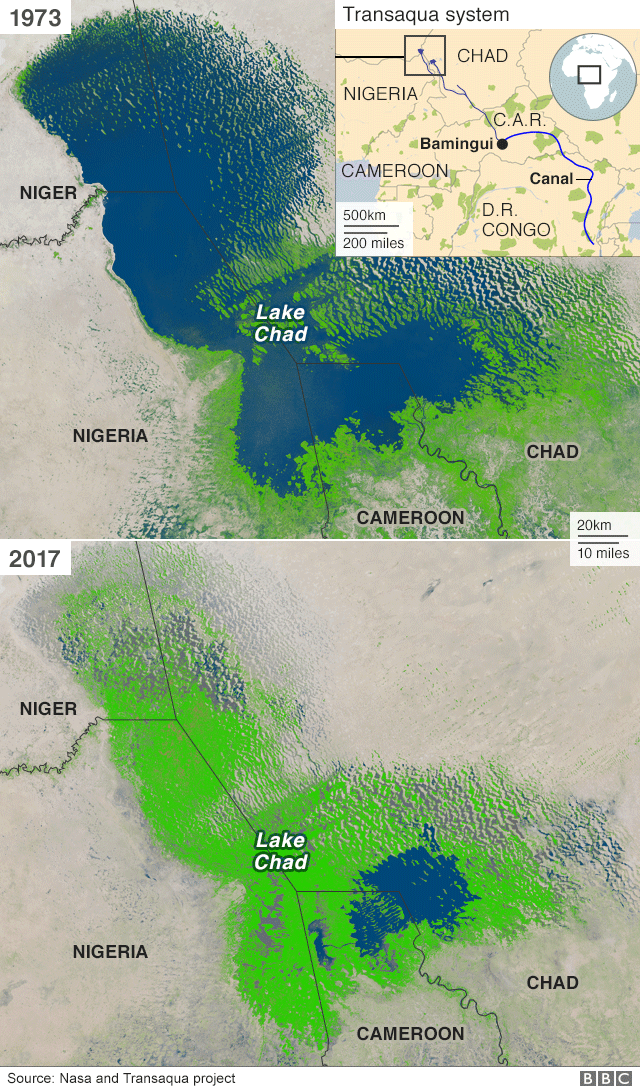6. Losing Lake Chad.
Building on from last week’s discussions of transboundary water resources in NRB, this week I will be exploring the Lake Chad Basin (LCB), which is shared by eight riparian countries and consists of a staggering 47 million people, covering 8% of the African continent (Galeazzi et al). It is revealed that whilst the LCB faces a plethora of challenges in the form of environmental issues, the lingering effects of colonial legacies and contemporary terrorist activity, unlike the NBA, no effectual transboundary agreement exists.
A common trend in much of my reading, the effects of colonialism remain, proving detrimental in the case of the LCB, heightening access inequalities (Marthur and Mulwafu), with a need to decolonise water rights being addressed as vital to much of Africa’s future development (Van Koppen, 2018). The Maga Dam on the Logone-chari River for example, built in Cameroon during the French colonial era, significantly reduces inflow to the lake, a similar story to numerous dams found along the Jama’are and Hadeja in Nigeria (Asah), demonstrating the lingering adversities of colonial rule. Likewise, increased irrigation since this time, has further exacerbated water scarcity levels in the region (IUCN), with all these problems demonstrating the pressing urgency for river basin management, with the ever-soaring likelihood of conflict in the region (Asah), intensified by the environmental monitoring network in the region, the Lake Chad Basin Commission (LCBC), noted as, 'inadequate, sparse, poorly funded and badly operated' (UN).
“Lake Chad is shrinking while the population is exploding. It’s a challenging situation. With less land, less rainfall, these are very unique problems for the country” Nigerian President Buhari.
Following severe reductions in levels of precipitation in the 1970s and 1980s, surface waters in Lake Chad have reduced from 18,000km2 to below 2,000km2 (IAEA). This follows the trend for many African water resources, with climate change intensifying pressures, increasing variability in rainfall and river discharge (Goulden et al, 2009).
Lake Chad has shrunk by an estimated 90% since the 1960s. Source.The effects of such strains on water resources are clear, with about 6.9 million people facing food insecurity in the Basin during the 2017 lean season (FAO). Furthermore, entire communities have since switched from a fishing-lifestyle to that of farming and agriculture, deserting the shores of the lake and instead isolating themselves inland (Pope, 2008).
Moreover, the actions of the jihadist terrorist group, Boko Haram, must be acknowledged when discussing the politics of the Lake Chad region. This conflict has escalated, with April of this year being viewed as one of the deadliest periods since 2015, with an estimated 1,491 deaths being linked to Boko Haram (CFR). Such brutality has significantly worsened strains on water supplies, with 2.4 million people having been displaced (UNHCR) and limited access to humanitarian aid.
A visual demonstrating the number of citizens to have fled crisis affected areas due to Boko Haram. Source.Furthermore, it is clear that gender plays a mighty role in Boko Haram’s plague of destruction, with the kidnapping of the 276 Chibok Schoolgirls in 2014 gaining international media attention, thousands of mothers facing untimely widowhood, and the ‘weaponisation’ of women’s bodies being a shockingly common tactic by terrorists in the region, used as human shields and bomb vessels (Okoli).
An important voice.It is clear that the LCB is facing a plethora of challenges ranging from climate change to entrenched legacies of colonialism that has also helped fuel the emergence of terrorist groups such as Boko Haram. Strategies targeted at alleviating scarcity such as transboundary cohesion and equitable distribution of water resources are clearly imminently required, with a need for bottom-up community approaches as opposed to large-scale top-down plans such as the proposed $10billion Transaqua Dam (Adeniran). Moreover, there is clearly a pressing need to recognise the plight faced by women in particular, with persistent stigma surrounding water and sanitation undercutting current development strategies across the region (McFarlane), evidently requiring further investigations, as my next blog will explore.



i really enjoyed reading this. you were detailed and used multimedia to back up your point through graphs and videos. the information was easy to read and you had good literature interaction. overall very well done!
ReplyDeleteThank you Maha.
Delete